Before NFTs, digital ownership was not thought of the same way. Now with the advancement and implementation of NFTs across multiple industries, many are curious to know if you can simply copy an NFT?
You can’t copy an NFT because it’s a unique address published on the blockchain. However, you can copy the underlying creations of an NFT, which are subject to copyright laws. Also, copying an NFT’s underlying creation does not grant you access to the utility that might come with ownership of an NFT.
To really understand why you can’t simply copy an NFT, it’s important to know what an NFT is and what you actually own when you buy one.
What Is An NFT?
An NFT is a line of code. That’s it! It’s a digital representation of something such as an image or video, that is minted on the blockchain. Distinguishing the difference of an NFT from its underlying work is the key takeaway.
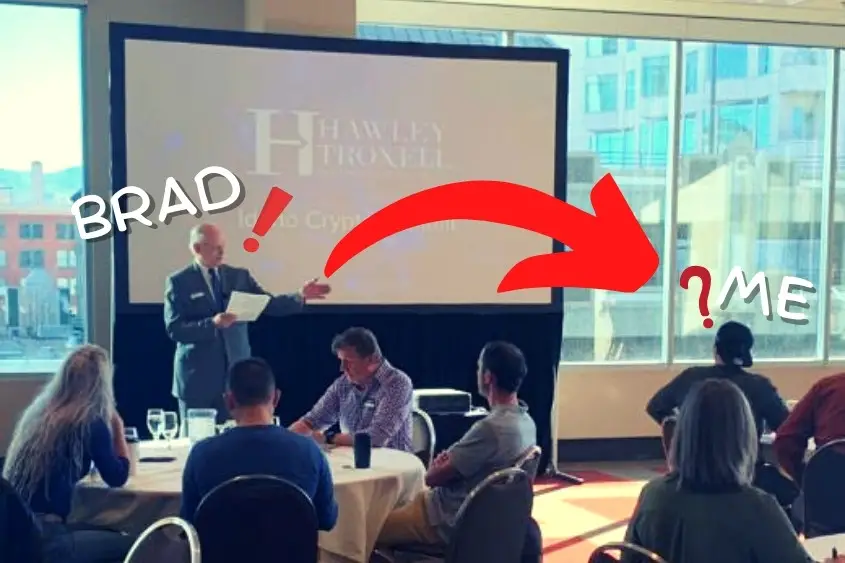
While attending the Idaho Crypto Summit hosted by Bradlee R. Frazer, an Internet & Intellectual Property Attorney at Hawley Troxell, Brad quickly corrected me when I stated that Beeple’s image Everydays: The First 5000 Days, was an NFT. I learned that it is not an NFT.
To better understand what an NFT is and why it’s technically impossible to copy one, let me first explain what I learned about copyright from Brad.
First off, he noted that copyright is a noun, not a verb. You receive copyright when you have a sufficiently creative idea that is then fixed into a tangible form of expression. The author is the sole owner of the copyright unless the owner legally transfers the copyright to someone else.
Furthermore, in accordance with 17 U.S.C. Section 106, the copyright holder may also stop others from copying, distributing, making derivative works, publicly performing, and publicly displaying your work.
That being said, the original creative work of an NFT and its copyright lives independently from the blockchain. Purchasing an NFT generally results in the acquisition of a URL or URI that links to the underlying work, not the work itself.
Okay, but what about smart contracts? Aren’t they a legally binding contract?
According to the Copyright Review Board, only a person can be an agent in law. That means artificial intelligence like smart contracts can’t enter contracts. So, if the creator of an NFT is utilizing smart contract technology to issue their holders’ copyright, then it’s still unclear whether it’s legally valid or not.
Why You Can’t Copy An NFT
You can’t copy an NFT because it is an immutable code that lives on the blockchain. Now, I suppose you could literally copy the text that makes up the code, but there’s nothing you could do with it beyond looking at it.
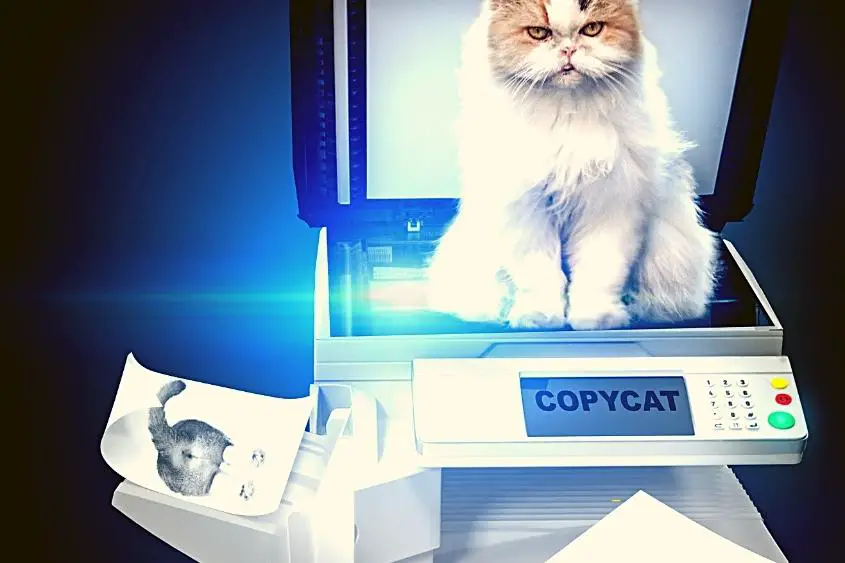
Since an NFT’s code is immutable—meaning it’s unable to be changed—there will forever only be one of those codes to exist on the blockchain.
So what do you really get when you buy an NFT?
Legally speaking, you are buying the “immutable proof of provenance” (basically you’re buying code that was minted on the blockchain that represents something else), but not the underlying creation or its copyright.
Of course, you might still receive other value via utility from the underlying work and the flex of owning the NFT, but that’s about it. That’s why you can’t technically copy an NFT. Yes, you can copy the underlying work of an NFT, but there’s no way to copy the actual ownership of the code that lives on the blockchain for it is immutable.
Can An NFT’s Image Be Copied?
If you can’t technically copy an NFT, then can you copy its underlying creation such as an image? It depends.

You can’t copy an image associated with an NFT that has copyright to reproduce, publish or distribute the work. That would be a copyright infringement, which is illegal. To use someone else’s image or creative work, you need to get permission from the copyright holder.
Remember, the copyright holder is the original creator of the work, not the holder of the NFT (unless the creator signed over the copyright to the NFT holder). So if you want to use an image or any other underlying work from an NFT beyond what’s allowed by the Fair Use doctrine, then you need to find out who legally holds the copyright to get a license or permission to use it from the creator.
The Fair Use doctrine is a legal doctrine that promotes freedom of expression by permitting the unlicensed use of copyright-protected works in certain circumstances. Some acceptable examples for using a work that has copyright include criticism, parody, news reporting, research, and teaching.
So if you are someone with a mastermind plan to use someone else’s work to benefit yourself, you might want to reconsider.
Are There Fake NFTs?
There is no such thing as a fake NFT. Since every NFT is published as a unique and immutable code on the blockchain, there can only ever be one of the same NFT. But there can be NFTs that use the same underlying work as a previously published NFT. The blockchain will always reveal the true asset.
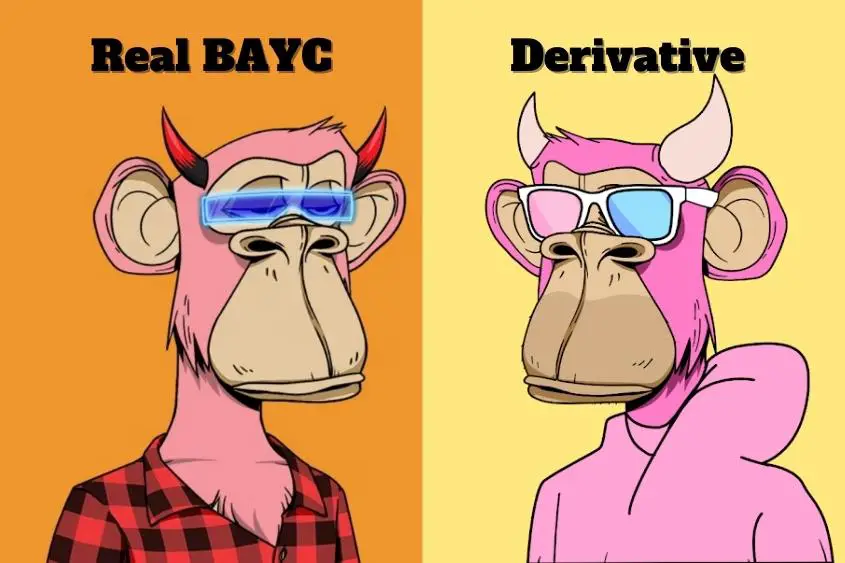
When people ask the question regarding fake NFTs, what they’re really asking is if someone can create a separate NFT and utilize the same underlying work that was used in the creation of the original NFT? The answer is yes, of course!
The same way that I can copy an image from the internet and republish it to the internet as my own, can be done on the blockchain with NFTs. That’s not to say that it is right or even legal, but it has been done before.
That’s the beauty of the blockchain though when compared to the internet. The internet isn’t a ledger, so it’s more difficult to track down who the original creator is. Whereas the blockchain is a digitally distributed, decentralized, public ledger, meaning you can use a blockchain explorer like Etherscan to view every transaction that has ever occurred to find out who the creator is and when an NFT was first created.
If you ever suspect that an NFT represents the work of another NFT brand, make sure to check the blockchain to ensure that what you are purchasing was created by the right person and confirm the date of creation. If you don’t know who initially created an NFT and the date they published it, then you probably shouldn’t be buying an NFT.
Who Can Sue For Copying An NFT’s Underlying Work?
Only the copyright owner can sue you for using an NFT’s underlying creative work. If the creator retains copyright ownership, then they can sue you. If the NFT holder obtains the copyright to the NFT’s underlying work, only then, can they sue you.
For example, let’s say that I painted a beautiful piece of artwork on a canvas. Then I decided to mint that same piece of art on the blockchain as an NFT. My best friend Bob notices my new NFT and decides to buy it. Cool, now he owns the NFT.
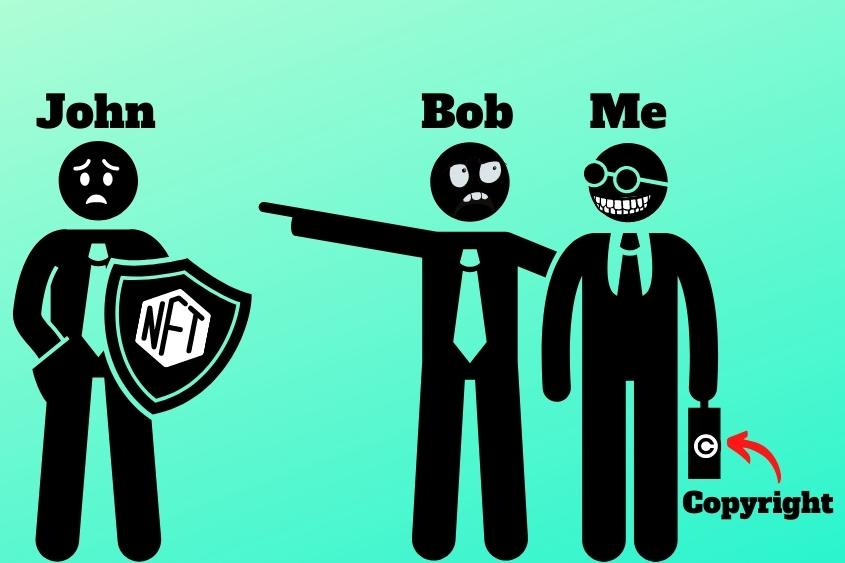
But wait, his worst enemy John decides that he’s going to right-click save the image from Bob’s NFT to create his own clothing line. Bob wants to sue John for using his NFT, can he? No.
Since Bob only owns the NFT (a digital representation of my original artwork), he has no right to sue John. Since I am the original creator, that automatically makes me the copyright owner. And since I never transferred the copyright to Bob, there’s nothing he can do about John making a fortune from the image he right-clicked save from his NFT.
However, if Bob were to inform me that John was using my artwork to profit from his own clothing line, then I would have a right to sue John. Take that!
Why Would Someone Want to Copy An NFT Then?
There are a few reasons why someone might want to copy an NFT. Below are some of the most common reasons.
- There’s a common misconception about what an NFT really is.
As you may realize from reading this article, the common misconception that an NFT is just an image or some other form of underlying creation is the main culprit behind why someone claims they can easily copy an NFT.
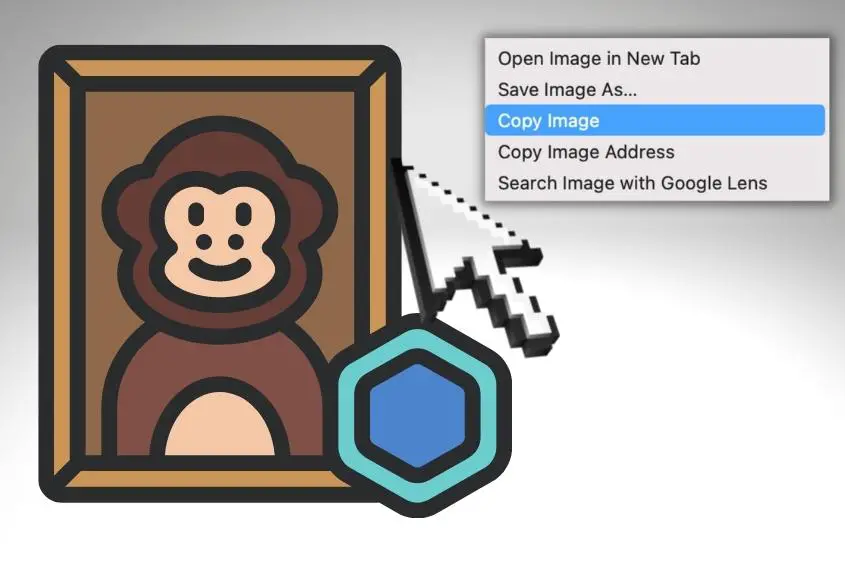
Many people who don’t fully grasp the potential of NFT technology generally use the right-click save threat as a way to troll those who are bullish on the technology. With that being said, there is a lot more value to NFTs than just the underlying work.
Many NFTs come with additional perks known as utilities. Utilities can range from physical products to access to real-life events. To unlock these perks, you must hold the NFT in your wallet to verify you are the owner. You don’t need to own the copyright to unlock utilities, generally, all you need is the NFT.
- To flex something that isn’t yours.
In the world of NFTs, it’s common to see NFT holders flex their NFTs on their social media profile pictures, tattoos, and even on their own clothing. But not everyone can afford to spend thousands of dollars on some of these blue chip NFTs, hence why they prefer to copy the image and showcase it like it’s their own.
The funny thing is—knowing what we know now—even most NFT holders don’t actually own the image of their NFT that they’re showing off online, they’re simply showcasing that they own a representation of the original asset. I’m guilty of this myself.
- To monetize something that’s already largely successful.
Take a look around any NFT marketplace and you will find hundreds, if not thousands, of derivative NFT projects of some of the most successful NFTs ever released. Bored Ape Yacht Club and CryptoPunks are among the most copied NFT brands on the market today.
Why is that? Because people want to use other people’s ideas and success to benefit themselves. Although I won’t get into the legalities of derivative projects (I’m not a lawyer), I suspect that many of them have broken the law(s) to some degree.
Even more so, I have seen people selling clothing that was designed using some of the most popular NFT projects and get away with it too. Of course, people will continue this illegal behavior until some repercussions occur. Until then, welcome to the jungle baby! (Again, not legal advice.)
Ultimately, copying an NFT is impossible. But copying the underlying creation of an NFT such as the audio, a video, an image, or other media files is possible, and has been done many times in the past. Before you buy an NFT, always double-check the blockchain to ensure it’s the one you want. And if you’re a creator, don’t use someone else’s work, use your imagination.

4 thoughts on “Can NFTs Be Copied? This Common Misconception Explained”
Comments are closed.